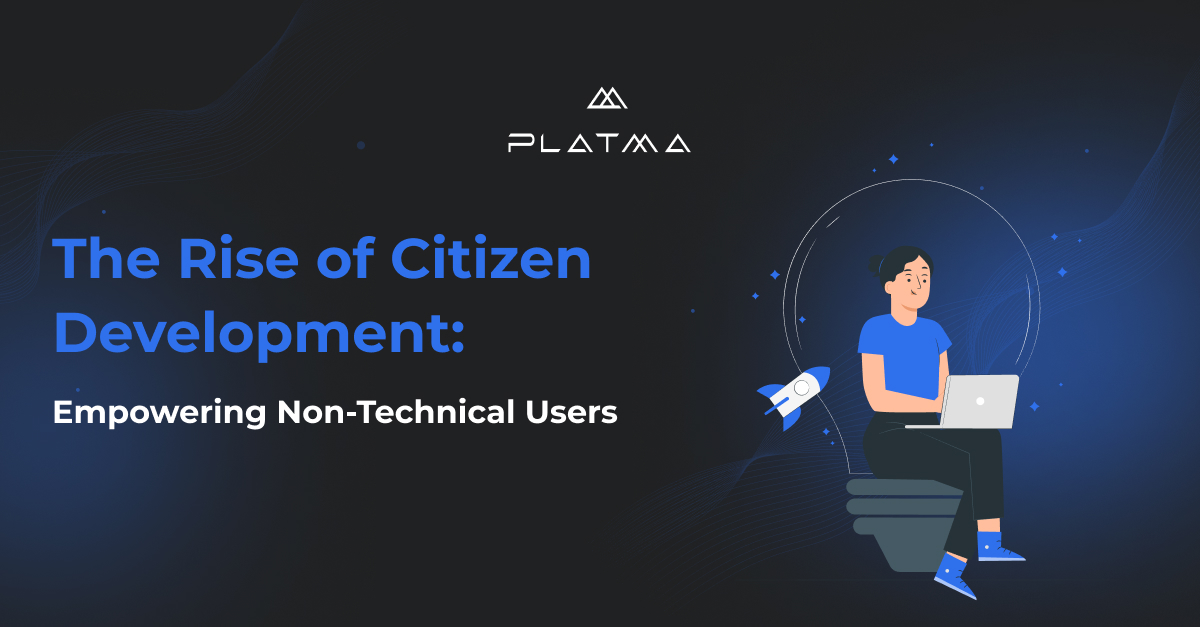In today’s fast-paced digital age, businesses are constantly seeking innovative ways to streamline their processes, boost efficiency, and stay competitive. One transformative trend that has gained significant traction in recent years is the rise of citizen development. This approach empowers non-technical users to become active contributors to application development, catalyzing a new era of innovation and collaboration within organizations. In this article, we’ll explore the concept of citizen development and how platforms like PLATMA are at the forefront of this revolution.
Understanding Citizen Development
Citizen development refers to the practice of allowing employees who lack formal coding or technical skills to create and customize applications using low-code or no-code development platforms. This trend recognizes that the traditional model of IT departments handling all software development tasks is no longer sustainable in the face of rapidly evolving business needs.
The Driving Forces Behind Citizen Development
Several key factors have contributed to the rise of citizen development:
Growing Technology Accessibility: User-friendly, low-code platforms like PLATMA have made it possible for individuals with limited technical backgrounds to participate actively in application development.
Rapid Digital Transformation: Organizations are under immense pressure to digitize their processes quickly. Citizen development enables them to adapt to changing market conditions swiftly.
Increased Demand for Customization: In a competitive landscape, businesses need applications tailored to their unique requirements. Citizen developers can address these specific needs more efficiently than traditional development teams.
Cost Reduction: Citizen development reduces the burden on IT departments and can significantly cut development costs, as it doesn’t require an extensive team of professional developers.
The Role of PLATMA in Empowering Citizen Developers
PLATMA is one of the pioneering low-code platforms that have played a pivotal role in democratizing application development. Here’s how PLATMA and similar platforms empower non-technical users:
Intuitive Visual Interfaces: PLATMA offers an intuitive drag-and-drop interface, allowing users to design and customize applications without writing a single line of code. This simplicity opens up development opportunities to a broader audience.
Pre-built Templates and Components: PLATMA provides a library of pre-built templates and components, enabling citizen developers to accelerate development and create sophisticated applications with ease.
Scalability: Applications built on PLATMA can scale alongside business growth. Citizen developers can start with simple solutions and expand them as their needs evolve.
Security and Compliance: PLATMA prioritizes security and compliance, ensuring that applications created by citizen developers meet industry standards and regulations.
Collaboration: PLATMA promotes collaboration between citizen developers and IT professionals. IT departments can oversee and support citizen-developed projects, ensuring alignment with organizational goals.
Benefits of Citizen Development with PLATMA
The adoption of citizen development, facilitated by platforms like PLATMA, offers several notable advantages:
Faster Time-to-Market: Citizen developers can swiftly respond to business needs, reducing the time it takes to roll out new applications or features.
Cost-Efficiency: Organizations can cut development costs and reallocate resources more effectively by leveraging internal talent.
Innovation: A diverse group of citizen developers can bring fresh perspectives to application development, sparking innovation within the organization.
Agility: Citizen development promotes agile development practices, allowing businesses to adapt rapidly to market changes.
Employee Empowerment: Non-technical employees who engage in citizen development gain valuable skills and feel more invested in the success of their projects.
Challenges and Considerations
While citizen development offers numerous benefits, it’s not without challenges. Organizations must consider issues such as data security, governance, and the need for adequate training and support for citizen developers.
The rise of citizen development is transforming the way organizations approach application development. Platforms like PLATMA are at the forefront of this revolution, enabling non-technical users to become active contributors to innovation. As businesses continue to embrace citizen development, they will unlock new opportunities for growth, agility, and competitiveness in the digital era.






